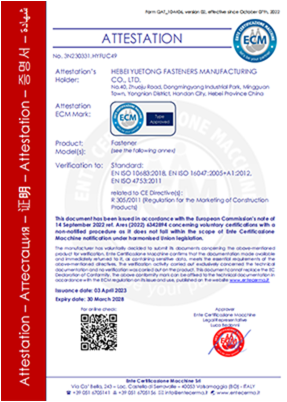दिसम्बर . 14, 2024 14:20 Back to list
Assessing Bolt Quality for Optimal Performance in Mechanical Applications
Understanding Bolt Quality A Critical Element in Engineering
In the realm of engineering and manufacturing, the quality of bolts is often underestimated yet remains a pivotal aspect of structural integrity and overall performance. Bolts, commonly used in various applications ranging from construction to automotive industries, are critical fastening elements that must meet stringent quality standards to ensure safety and reliability. This article delves into the significance of bolt quality, the factors that influence it, and strategies for ensuring high standards in bolt production.
The Importance of Bolt Quality
Bolts serve as connectors in numerous applications, playing a key role in maintaining the structural integrity of assemblies. Poor quality bolts can lead to catastrophic failures, causing collapses in buildings, malfunctioning machinery, or even life-threatening situations in the aerospace sector. Therefore, understanding and ensuring high bolt quality is not just a technical requirement but a matter of safety and efficiency.
High-quality bolts contribute to the longevity and durability of structures and machines. They withstand stresses from dynamic loads, resist corrosion, and maintain their mechanical properties under varying environmental conditions. Consequently, manufacturers must prioritize bolt quality to enhance the reliability and performance of their end products.
Key Factors Influencing Bolt Quality
1. Material Selection The choice of raw materials is fundamental to producing high-quality bolts. Steel bolts must have appropriate chemical compositions and mechanical properties to withstand operational stresses. Options such as stainless steel, alloy steel, and carbon steel are popular choices, each offering unique benefits in terms of strength, corrosion resistance, and thermal stability.
2. Manufacturing Processes The methodology used in bolt production significantly affects quality. Processes such as forging, machining, and heat treatment must be carefully controlled to achieve desired properties. Forging, for example, enhances strength by aligning the grain structure of the metal, while heat treatment can increase hardness and relieve internal stresses.
3. Surface Finish The surface condition of bolts impacts their performance and longevity. A smooth surface finish can reduce friction during installation and ensure better torque performance, while appropriate coatings can provide corrosion resistance. Common coatings include zinc plating, galvanizing, and organic coatings.
bolt quality

4. Quality Control Rigorous quality control systems are essential to ensure every batch of bolts meets specified standards. This involves conducting regular inspections and tests such as tensile strength tests, hardness tests, and resistance to fatigue testing. Adhering to international standards such as ISO 898-1 (for steel bolts) ensures that the bolts produced meet or exceed industry expectations.
5. Testing and Certification Before bolts are delivered to clients, they must undergo a series of tests to certify their quality. These may include non-destructive testing methods like ultrasonic testing or X-ray inspections to detect any internal defects without damaging the bolts. Certifications from recognized standards organizations can also enhance trust in the quality of the bolts among consumers.
Best Practices for Ensuring High Bolt Quality
- Invest in R&D Continual research and development efforts can lead to improved materials and manufacturing techniques, ensuring that bolts remain competitive and reliable under evolving industry standards.
- Partner with Quality Suppliers Collaborating with reputable suppliers for raw materials can enhance the initial quality of bolts. Suppliers should provide certifications and documentation verifying the quality of their materials.
- Implement Lean Manufacturing Adopting lean manufacturing principles can improve efficiency while reducing waste in the production process, allowing for greater focus on quality.
- Continuous Training Providing ongoing training for employees involved in the manufacturing and testing of bolts can foster a culture of quality and precision. Skilled workers are more likely to identify and correct potential defects in production.
Conclusion
In summary, the quality of bolts is a fundamental aspect of engineering that safeguards safety and enhances performance across various industries. By emphasizing material selection, manufacturing processes, quality control, and testing, companies can elevate their bolt quality to meet the rigorous demands of modern applications. As technology evolves, staying updated with best practices and standards will be crucial for manufacturers aiming to lead in the fast-paced world of fasteners. Prioritizing bolt quality not only benefits the manufacturer but also the end-users who depend on the reliability and safety of these essential components.


